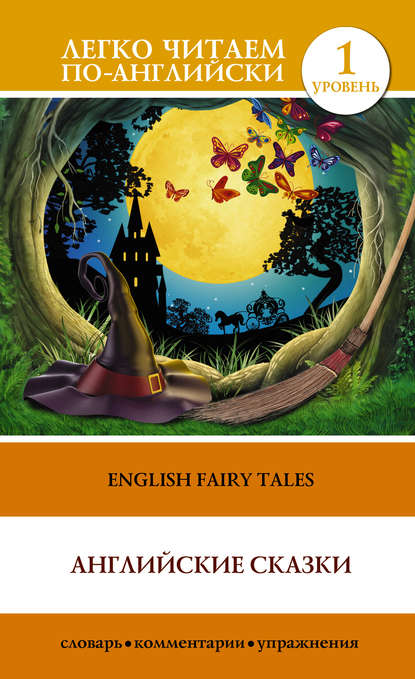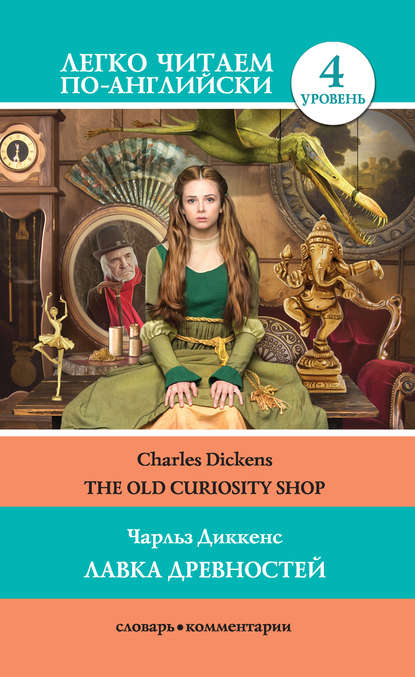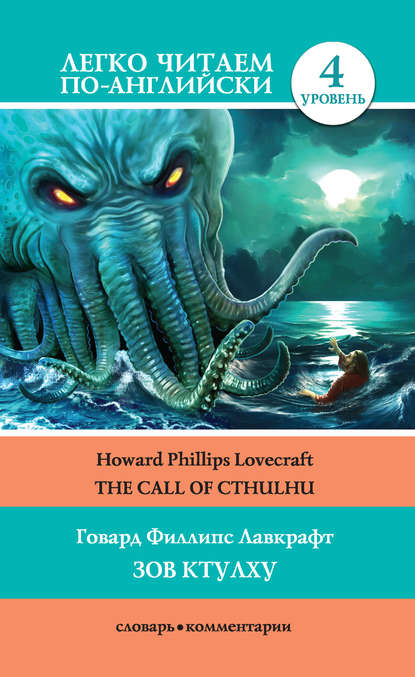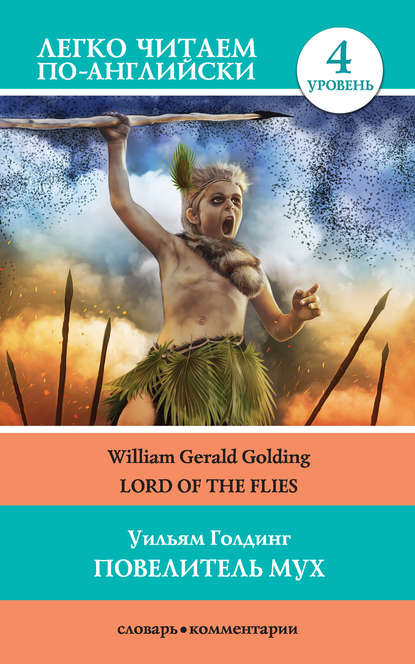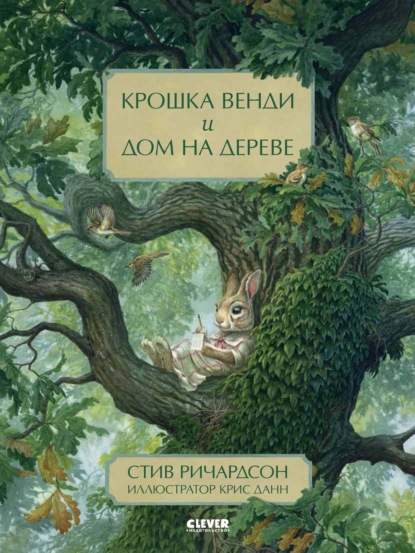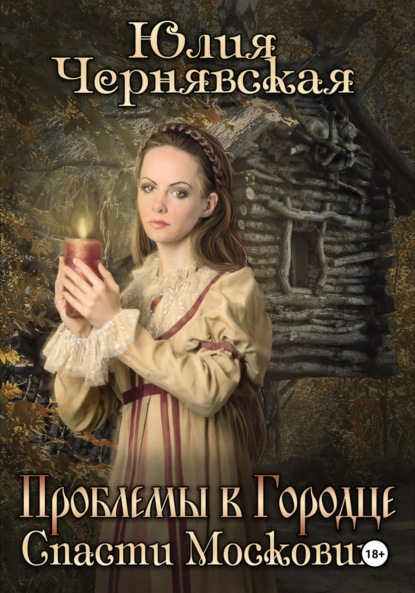Золотой жук. Уровень 1 / The Gold-bug
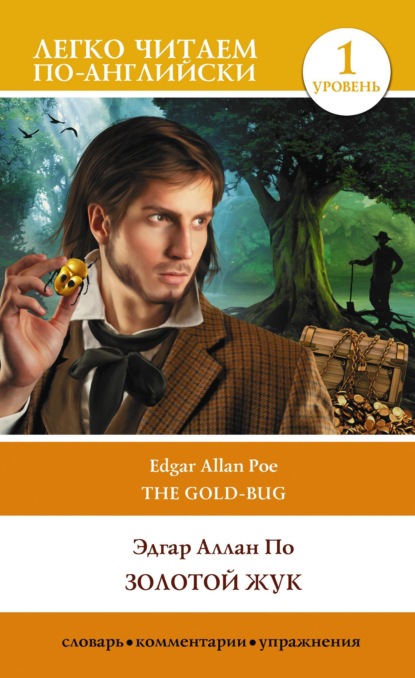
- -
- 100%
- +

© Смирнова А. И., адаптация, упражнения, словарь, 2023
© ООО «Издательство АСТ», 2023
Edgar Allan Poe
The Gold-Bug
The murders in the rue Morgue
I met Dupin in France in the summer of 18-. His family was once rich and famous. Now, due to some unfortunate events, he was poor. He had so little money he only could buy the most necessary things. But it bothered him little as well. He could afford a few books – fortunately, these were easy to buy in Paris – and that was enough for him to be happy.
We first met each other at an obscure library in the Rue Montmartre. We were searching for the same very rare and remarkable book. We saw each other again and again. Soon we began to talk. He told me the history of his family which I found very interesting. I was also surprised how well-read he was. I felt that the society of such a man would be to me a treasure beyond price. Eventually we decided to live together while I’m in the city as it was beneficial to both of us.
We never had visitors and spent our time reading, writing or talking. One could call us madmen because of our hermit lifestyle. But we enjoyed our loneliness. When it was nighttime, we used to go for a walk, arm in arm, continuing the topics of the day. So were the days.
I soon noticed his ability to look through one’s soul. He surprised me by telling what he knew about my own soul. He knew things about me that only I could knew. At these moments of insight, he was cold and distant; his voice became high and nervous. At such times, I thought of him as a double Dupin – the creative and the resolvent.
One night we were strolling down one of the long dirty streets of Paris. Both of us were silent, each thinking our own thoughts. Suddenly Dupin broke the silence:
“He is a very little fellow, that’s true, and would do better for less serious acting.”
“Absolutely, no doubts about that!” I answered unwittingly.
For a few seconds I continued walking, and thinking; but suddenly I realized that Dupin agreed with something which was only a thought.
“Dupin,” I said, “this is beyond my understanding. How could you know that I was thinking of…”
“How did I know you were thinking of Chantilly? You were thinking that Chantilly is too small for the plays in which he acts.”
These were exactly my thoughts.
“Tell me, for Heaven’s sake,” I exclaimed, “the method-if method there is-by which you are able to look through my soul in this matter.”
“It was the fruit-seller.”
“Fruit-seller!? I know no fruit-seller.”
“He ran up against you as we entered the street – it was fifteen minutes ago.”
I now remembered that. A fruit-seller was carrying a large basket of apples; he almost threw me down. But I still didn’t understand what it had to do with Chantilly.
“I will explain,” he said, “listen to me carefully.”
“First, the fruit-seller ran into you. You stepped into one of the loose fragments of the pavement. The uneven stones hurt your ankle and you muttered a few words; then you proceeded in silence. You kept looking at the stones, and, when we entered the little alley Lamartine, you noticed it was paved with the overlapping and riveted blocks. I read your lips saying ‘stereotomy’. I knew you couldn’t say that without thinking of Epicurus. Not long ago you and I were talking about his ideas about the earth and the stars and the sky. You then looked up in the sky which confirmed my guess. I too looked up and saw the group of stars, that we call Orion, is very bright and clear tonight. I knew you would notice this too.”
“Now, the most interesting part. Yesterday, in the newspaper, there was an article about the actor Chantilly. The satirist made some unflattering commentary on the actor’s name in reference to Orion, formerly written Urion. It was clear you would combine the two ideas of Orion and Chantilly. Your smile, again, confirmed my guess.”
“Then I saw you stand straighter, making yourself taller. By that I knew you were thinking of Chantilly’s size and then I finally made my commentary.”
Not long after this, we were looking over an evening edition of a paper. A paragraph caught our attention:
Extraordinary Murders
This morning, about three o’clock, the inhabitants of the Quartier St. Roch were waken up by horrifying screams. The screams were coming from a house in the Rue Morgue, where Madame L’Espanaye, and her daughter, Mademoiselle Camille L’Espanaye lived. Some neighbors called the policemen, then ran altogether toward the house. By the time they reached the house the screams ceased. They couldn’t get inside the house the usual way as no one responded to their calls, so they forced the door open. As they rushed in, they heard voices that came from above. They hurried from room to room but found nothing. Then they reached the fourth floor and found a door. It was firmly closed and locked with the key inside. They forced the door open and a scene of horror appeared before them.
The room was in the wildest possible order. All chairs and tables were broken and lying all over the place. On a chair lay a razor covered with blood. On the hearth were two or three long and thick tresses of grey human hair, also in blood. It seemed like someone pulled them out of the roots. Upon the floor were two bags with almost four thousand francs in gold inside. There was no trace of Madame L’Espanaye. After searching in the chimney, the police found the corpse of her daughter. There were many severe scratches upon her face; dark bruises and deep indentations of finger nails were on her throat, as if someone strangled her to death.
Finally, they found the body of Madame L’Espanaye outside. It lay behind the house; her neck was almost cut through. When they tried to pull her up, her head fell off.
To this horrible mystery there is not as yet, we believe, the slightest clew.
The next day’s paper had these additional particulars.
The Tragedy in the Rue Morgue
The police questioned many people about the extraordinary and frightful killing but still has no answer who is the killer or killers.
Pauline Dubourg, washwoman, claims she knew both women for at least three years. She was washing their clothes during that period. The old lady and her daughterseemed to be on good terms[1] – very affectionate towards each other. She did not know where their money came from but they paid her well. She also never met anyone in the house except these two women who lived on the fourth floor.
Pierre Moreau, tobacconist, claims he sold small quantities of tobacco and snuff to Madame L’Espanaye for nearly four years. She and her daughter occupied the house in which the corpses were found, for more than six years. People say they had money. The house was the property of Madame L. He never saw anyone enter the house except Madame L. and her daughter and a doctor eight or ten times, perhaps.
Other neighbors said the same thing. Almost no one ever went into the house and Mrs. L’Espanaye and her daughter were not often seen.
Jules Mignaud, banker, claims Madame L. had money in his bank; she put small sums in her account for eight years. Three days before her death she took out of the bank a large amount of money, in gold. A clerk went home with the money.
Isidore Musèt, a policeman, says he was called to the house about three o’clock in the morning. He was the one who forced the gateway. While opening the gate, he heard shrieks. They suddenly ceased when the gate was open. They were loud and drawn out, not short and quick. When he entered the house, he heard two voices in loud and angry contention-the one a gruff voice, the other much shriller. He was not sure whether it was the voice of a man or of a woman but he was sure the gruff voice was of a Frenchman and the shrill voice was speaking Spanish. He does not speak Spanish himself.
Henri Duval, a neighbor, claims he was one of the party who first entered the house. He, too, heard the voices speaking. He could not distinguish the words, but was convinced by intonation that the shrill voice was of an Italian. He does not speak Italian himself.
Alfonzo Garcio, a native of Spain, was also one of the party who entered the house. He thinks the gruff voice was of a Frenchman and the shrill voice of an Englishman. He does not understand the English language, but judges by the intonation.
William Bird, another foreigner, an Englishman, also entered the house first. He claims the shrill voice was speaking Italian. He does not understand Italian himself.
Mr. Alberto Montani, an Italian, was passing the house at that time and heard voices too. He thinks the shrill voice belongs to a Russian. He never conversed with a native of Russia.
All witnesses agreed that the chimneys of all the rooms on the fourth floor were too narrow for anyone to escape.
Paul Dumas, a doctor, was called to see the bodies soon after they were found. They were in a horrible condition. Such results could not come from a woman’s hands, only from those of a very strong man. The daughter was strangled by strong hands around her neck.
That’s all the police knew. This was the strangest killing in Paris of all time.
Later, we read in the paper that the police arrested and imprisoned Adolphe Le Bon, although nothing appeared to criminate him. I could tell that Dupin was interested in the progress of this affair. He asked my opinion on the murderers. I said I saw no means by which it would be possible to trace the murderer.
“We must not judge of the means,” said Dupin, “the Parisian police is famous for its acumen. They have a vast parade of measures but, for the most part, they achieve results by simple diligence and activity. When these qualities are useless, their methods fail. There is such a thing as being too profound. If you look at an object too close your vision may become poor; you lose sight of the matter as a whole. Truth is not always deep in a well. In fact, I do believe that she lies on the surface. Let us go to the house and see what we can see. There must be an answer.”
We got permission and proceeded at once to the Rue Morgue.
It was late in the afternoon when we reached the house on the Rue Morgue. There were still many curious people; they were gazing up at the closed shutters. Before going in the house, we inspected the outside. Dupin carefully examined the street as well as the house. Then we entered the house. Dupin looked with great care at everything, at the bodies, the walls, the fireplace, the windows. I saw nothing new beyond what the paper told us. We examined all the rooms until dark and then went home. On our way home, my friend stepped in for a moment at the office of one of the daily papers.
It was his humor, now, to decline all conversation about the murder, until about noon the next day. Then he suddenly asked me if I saw anything peculiarat the crime scene[2]. Something in his manner made me shudder, I don’t know why.
“No, nothing peculiar,” I said; “nothing more, at least, than we both read in the paper.”
“Let’s forget about the paper. Everyone seems to be puzzled by the unusual nature of this crime. It seems there is no motive for such brutal killing. It also seems impossible that there were people talking upstairs while the police inspected the first floor, as there is no way for anyone to escape. The question here is not ‘what happened’ but ‘what happened that has never happened before’[3]. In fact, the most mysterious details of this case for the police led me to the answer.”
I stared at him in mute astonishment.
“I am now waiting”, he continued and looked toward the door of our apartment, “for a person who might be blamed for what happened; through I believe he is innocent for the worst portion of the crime. I look for the man here-in this room-every moment. He may not arrive but the probability is that he will. When he comes, we must detain him. Here are pistols; and we both know how to use them if necessary.”
During his monologue, his voice was so loud as if he was speaking to someone at distance. I took the pistols hardly realizing what I was doing. He continued:
“Now think about the voices upstairs; it was proved they were not the voices of the women. It shows that the old lady could not kill her daughter first and then commit suicide. I speak of this point mostly for the sake of method; it would be simply impossible for her to do such damage to her daughter and herself, as she is not that strong. The voices were of a third party. Now, did you notice anything peculiar in what people said about those voices?”
I remarked that, while all the witnesses agreed that the gruff voice belonged to a Frenchman, there was much disagreement about the shrill one.
“That was the evidence itself,” said Dupin, “but it was not the peculiarity of the evidence. You observed nothing distinctive. Yes, everyone agreed about the gruff voice being of a Frenchman, and everyone disagreed about the shrill voice. The strange thing is that when an Italian, an Englishman, a Spaniard, and a Frenchman tried to describe it, each one spoke of it as that of a foreigner. Each is sure that it was not the voice of one of his own countrymen.Now, how strangely unusual must that voice have really been![4] People recognized several European languages in its tone – but not a single word.
“I don’t know what you think now. But I believe these facts are enough to lead us to the only possible answer… I will not say it yet.
“Let us now take ourselves again, in our thoughts, to this chamber. What shall we first seek here? All possible ways for murderers to escape. The police examined the floors, the ceilings, and the masonry of the walls, in every direction. But I don’t trust their eyes so I examined the house with my own.
“There were no secret doors. The opening above the fireplace is not big enough for even a large cat. There is only one way to escape left. The windows. Now, this may not seem possible. We must prove that it is possible.
“There are two windows in the room. One of them is wholly visible; the lower part of the other is hidden by furniture. Both of them are made of two parts; to open the window one must lift up the bottom half. I looked carefully at the first of these windows. It was firmly closed, fastenedfrom within[5]. In its frame to the left, I discovered a very stout nail. The nail held the window closed. When I examined the other window, I discovered a similar nail in it. No one could raise the window when the killings were discovered. I, too, tried to raise the window and could not. This convinced the police there was no possibility of escape through the windows. But I knew what seemed impossible must be proved to be possible.
“I proceeded to think. If the murderers – or the murderer – escaped through one of the windows, the windows must have the power of fastening themselves. I put off the nail from the first window. Then I carefully felt the window and finally discovered the hidden spring. I pressed it and the window opened easily. But when I put the nail back in, it again was impossible to open the window. Now I knew no one could escape from that window.
“I went to the second window. There was a similar looking nail in it and a spring. Without touching the nail, I pressed the spring and tried to raise the window. Up it went! Turned out, that the nail was broken and only looked like it held the window tightly. And the spring was that mechanism that let the window to fasten itself.
Конец ознакомительного фрагмента.
Текст предоставлен ООО «Литрес».
Прочитайте эту книгу целиком, купив полную легальную версию на Литрес.
Безопасно оплатить книгу можно банковской картой Visa, MasterCard, Maestro, со счета мобильного телефона, с платежного терминала, в салоне МТС или Связной, через PayPal, WebMoney, Яндекс.Деньги, QIWI Кошелек, бонусными картами или другим удобным Вам способом.
Примечания
1
seemed to be on good terms – как будто бы были в хороших отношениях
2
at the crime scene – на месте преступления
3
what happened that has never happened before – что случилось такого, чего никогда не случалось раньше
4
Now, how strangely unusual must that voice have really been! – Насколько же необычен был этот голос!
5
from within – изнутри
